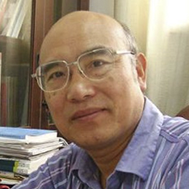
Xu Rongsheng
Xu Rongsheng- Researcher of Computing Center of Institute of High Energy Physics,Chinese Academy of Sciences
Research field: Network Engineering and Cyber Security, etc.
Having graduated from Mathematics and Mechanics Department of Peking University in 1970, Mr. Xu undertook computer programming in Hunan Institute of Computing Technology from 1972 to 1978. He got his Master’s degree in Experimental Particle Physics from the Graduate School of Chinese Academy of Sciences in 1982. Between 1982 and 1988, he studied in University of California at Santa Cruz, USA and obtained the PhD degree in Experimental Particle Physics.
Since his return back to China, he had been working in the Institute of High Energy Physics, Chinese Academy of Sciences. In 1993, he took charge of setting up the first network in China connecting to international Internet. He won HU Gang-fu Prize of Chinese Physical Society in the same year. From 1997 to 1998, he led the team of Research on Anti-hacker Software in a Key Project on Applied Research and Development of Chinese Academy of Sciences. The project won the first prize of Scientific and Technological Progress Award granted by CAS in 1999 and the second prize of National Scientific and Technological Progress Award granted by MOST in 2001. Since 2012, he has served as the Cyberspace Security Consultant of Davos World Economic Forum. He was a doctoral supervisor and the Chief Scientist of the National Computer and Network Intrusion Prevention Center.
He has been involved in research subjects of computer software development and network engineering. In the study of network security issues, by through the TCP / IP protocol analyzing, in-depth processing hardware under communications layer and optimizing application layer for the intrusion prevention needs, he achieved a variety of security tools in research and development. He also published "China Information Superhighway - Internet", "Hacking Techniques Secret", as well as popular science books "The Ghost of Information Field - Hackers" etc.
